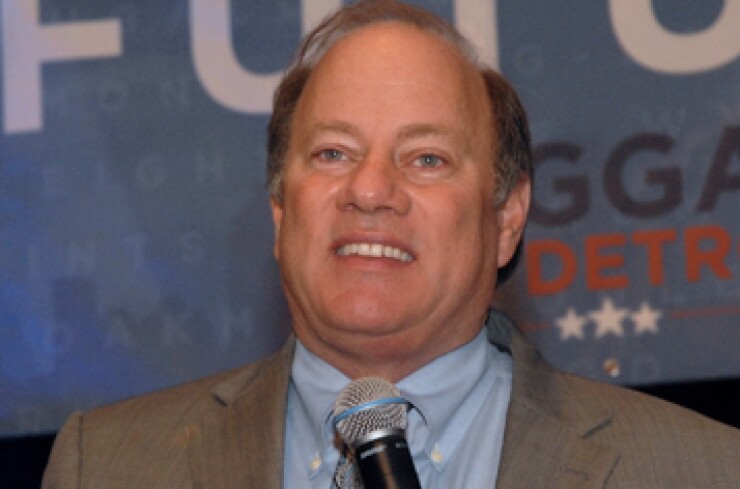
CHICAGO — Detroit rested its case in its bankruptcy confirmation trial Monday after Mayor Mike Duggan and City Council President Brenda Jones testified that they support the city's plan of confirmation.
U.S. Bankruptcy Judge Steven Rhodes, who is overseeing the case, has said repeatedly that local officials' testimony that they will work to implement the $1.4 billion reinvestment plan will be a key part of his consideration of whether the plan is feasible.
After Monday's hearing, Rhodes ordered a break in the trial until Oct. 14, adding that he expects closing arguments to begin the week of Oct. 20.
Separately, Michigan Gov. Rick Snyder told the Detroit News Monday that he thinks the city will be out of bankruptcy in the next 30 to 60 days.
During Monday's hearing, Rhodes also urged the city to reach more settlements with creditors, apparently referring to efforts to reach a deal with the bond insurer who wraps $1.1 billion of certificates of participation. The insurer, Financial Guaranty Insurance Co., is the last major holdout creditor in the case. It was reportedly in mediation talks Monday afternoon to try to reach a settlement.
Duggan's testimony Monday outlined his efforts to analyze the investment plan. After spending hours with department heads and Rhodes' independent municipal finance expert hired to review the plan, Duggan said he's "comfortable" that it would work, though it may require tweaks.
"I support this plan, and I believe it is feasible," Duggan said, according to local reports from the courtroom. "I can't predict a national recession. I can't predict a cut in state revenue sharing. I can't predict other casinos being approved. Those are the risks I signed up for as the mayor. I believe within this plan are the resources we need to be successful."
Noting that the plan rests on assumptions of 2% annual growth in income tax revenue — which hasn't happened in 10 years — Duggan said he believes the population of a post-bankrupt Detroit will begin to grow.
"There is a feeling of hope in this city," he said. "It's a big part of why we're starting to see the population stabilize."
The mayor estimated that the city is at about 10% of where it needs to be in terms of providing adequate services, and that the rebuilding will be a "multi-year process."
Duggan also said that he believes the city's exit financing needs to be kept "as low and possible," and suggested that it grew to $325 million from $275 million is because bankruptcy consultant fees came in $50 million over budget. He later told local reports that consultants' fees grew to $180 million, up from an estimated $130 million.
Council President Brenda Jones also said she supports the confirmation plan and believes the council and the mayor would be able to work together to implement it.
After the city rested its case, the holders of the FGIC-insured COPs called their first witness. Cynthia Thomas, executive director of the city's two pension funds, told the judge that the city's general employee fund was 77% funded and the police and fire fund 96% funded as of the end of fiscal 2012.
COPs attorney Jonathon Wagner asked her if the trustees had made "sound and prudent decisions" over the years. "That one brings me pause," Thomas said, according to reports.
Under questioning from Rhodes about why the funds were underfunded, the director blamed major investment losses post-2008 and the fact that retirees outnumber employees by a ratio of two to one.





